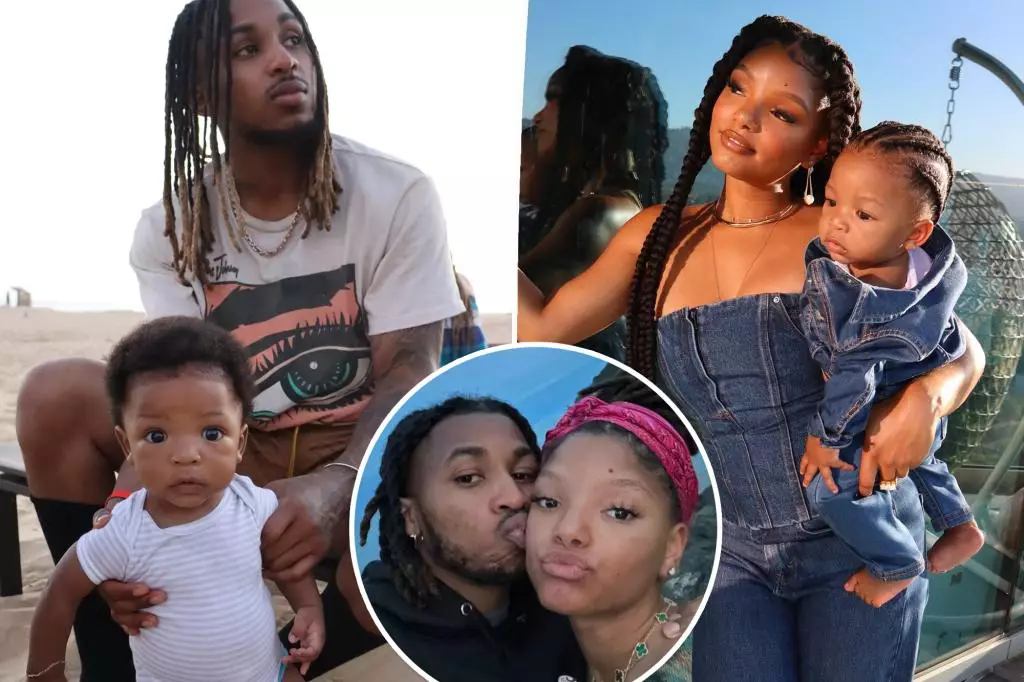In the chaotic world of celebrity relationships, few stories capture public interest quite like that of rapper DDG (Darryl Dwayne Granberry Jr.) and singer Halle Bailey. Their journey has been fraught with emotional highs and lows, public scrutiny, and now, a break-up that threatens to reshape their family dynamics. Despite their recent separation, DDG’s sentiments about wanting to expand his family resonate with deeper themes of commitment, co-parenting, and the desire for familial stability.
Recently, during a candid discussion on his YouTube channel, DDG expressed his intention to potentially have another child—not just any child, but specifically with Hale Bailey, despite the recent dissolution of their romantic relationship. This desire starkly contrasts with a modern trend where many opt for diverse family structures. DDG articulated a strong preference for a traditional approach that minimizes complications from multiple partnerships. This perspective invites consideration of societal expectations regarding parenting, particularly within the realm of celebrity culture, where unconventional dynamics often take center stage.
DDG’s assertion that he doesn’t want “baby mamas” reflects his introspective approach to parenting. He seems to harbor an understanding, perhaps born out of his own upbringing, that multiple mother figures could create chaotic environments for children. As he articulates his goal to maintain a close bond between siblings, it raises poignant questions about the emotional ramifications that age gaps can have on family relationships. His intention seems to aim not only for harmony but also for a nurturing environment—elements that are often muted in public discourse from high-profile figures.
As the rapper navigates this phase of co-parenting with Bailey, the contrasting emotions of love, loss, and friendship become palpable. Their official statement about the breakup highlights a mature understanding that extends beyond mere romantic entanglements. They reportedly remain best friends, which reflects a modern, albeit sometimes elusive, approach to relationships. The acknowledgment of a shared commitment to their child, Halo, emphasizes the importance of prioritizing parental responsibilities despite personal challenges.
The public nature of their split, however, invites scrutiny and often criticism. Following their announcement, social media became a battleground of opinions, notably evident during a Twitch livestream where DDG included their son unexpectedly. Bailey’s reaction, expressing distress over her child being viewed publicly without prior discussion, adds layers to their parenting journey. This incident underscores the challenges faced by parents in the public eye and sheds light on the critical importance of communication in co-parenting arrangements.
In recent interviews, DDG has indicated that he is not currently interested in dating, choosing instead to focus on his career and personal growth. This decision highlights a conscious choice for self-reflection during a transformative period in his life. The statement, “I don’t see the point anymore,” resonates with many adults navigating similar challenges after relationship changes.
Interestingly, this emphasis on self-care and professional development is reflective of a larger societal trend where individuals prioritize mental health and personal stability before reentering the dating scene. DDG’s resolve to stay focused on work rather than romance signals a rite of passage that many young adults undergo, recognizing that personal fulfillment often takes precedence over societal expectations of coupling.
As DDG contemplates fatherhood’s next chapter, the dynamics between him and Halle Bailey will continue to evolve. Their circumstances pose intriguing questions about love, commitment, and the complexities of modern parenting. While the story of DDG and Bailey may carry the weight of public interest, it ultimately speaks to universal themes of familial bonds, emotional resilience, and the search for fulfillment in personal and professional arenas.
With a commitment to prioritize their child’s well-being amid personal transitions, both DDG and Bailey highlight that love can manifest in various forms and that even through separation, respect and friendship can thrive. The resolution to maintain an amicable relationship for Halo’s sake sets a hopeful precedent, suggesting that while relationships may end, the potential for mutual support in parenting continues. As they navigate the future, both figures exemplify a journey that is as much about personal growth and acceptance as it is about family.

